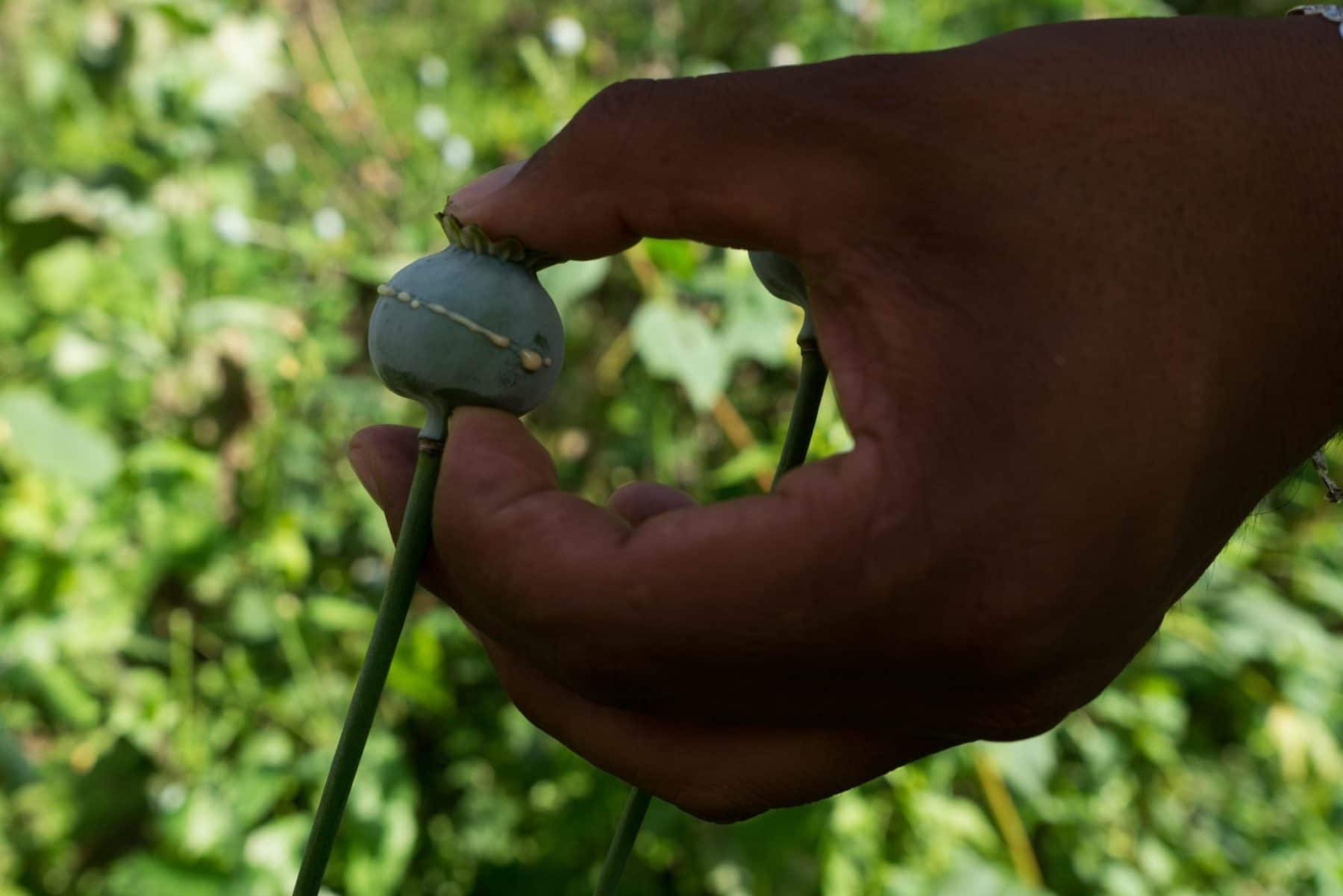Gonzalo Hernandez* first heard the word “fentanyl” about two years ago.
Hernandez, who lives in the sierra in the state of Guerrero in southern Mexico, farms a few hectares of an ejido, a collective farm set up after the Mexican Revolution, where he grows corn, beans and vegetables. But those crops are just for sustenance; low producer prices makes them inviable to bring to market. For Hernandez, like tens of thousands of others in the sierra of Guerrero, the only source of income is papaver somniferum: opium poppies.
“Growing poppies is necessary here,” he told Filter. “Not growing poppies means not having money. There are some little peon jobs here and there, but it’s not enough. Need forces you to do this.”
Hernandez and his family maintain a plot of about half a hectare of poppies, far away from the road and tucked away behind tall rows of corn to protect the plants from their main pest: soldiers. The Mexican Army, which has been on the streets fighting the drug war since 2006, is a constant threat to farmers in the mountains of Guerrero, where patrols enter farms without permission to find and destroy illegal crops.

Part of Hernandez’ poppy plot
Hernandez and other farmers in the area have an effective radio communication system that allows them to warn each other and avoid being caught by army patrols, but there’s nothing they can do to stop the soldiers from destroying their crops.
“You lose all hope when the army comes, because they’re going to destroy your plants and you’re not going to get the money you were hoping for,” he said. “But you just have to step aside, because if you don’t they could take you away.”
Diminishing Returns
If the poppies can survive three months after planting, the bright red petals will drop off and the mature seed pods can be sliced with a razor blade to release opium gum, which the family then sells to drug traffickers who visit their remote mountain town.
Hernandez expects that the poppies he has planted now will yield about half a kilogram of opium. A few years ago, that could fetch as much as 10,000 pesos, about $500.
But starting about two years ago, traffickers began offering less and less, and rumors circulated that the price drop was due to competition from a new synthetic drug, manufactured in China and also in some fentanyl-producing laboratories detected in other parts of Mexico. (Arthur DeBruyne reports for Filter on fentanyl’s impact on people who use drugs in northern Mexico.)
“They say it’s because of some other drug, fentanyl, made in China, I think,” Hernandez said. “That’s why they say the price went down.”
This year, Hernandez only hopes to get around six pesos per gram of opium—hardly worth the time and effort of raising the plants. But for now, he plans to keep planting to maintain the habit, with the hope that the price will rebound or a proposal to legalize the crop will materialize.
Guerrero is Mexico’s third-poorest state and the center of its opium industry. If the state of 3.5 million were an independent country, it would be the top opium producer in the Americas. The roughly 50,000 hectares planted with poppies in the state support the economies of thousands of communities and hundreds of thousands of people.

The Case to Legalize Poppy
As drug-related violence increases and policies aimed at stopping opium production have failed, proposals to legalize the crop are being taken more and more seriously. Last fall, the state legislature of Guerrero passed an advisory resolution to legalize poppy farming, and the new federal government led by Andrés Manuel López Obrador is analyzing the idea.
For Hernandez, legalization represents the chance to completely change his relationship to a government that has forced him into an illegal activity, and then persecuted him for it.
“The government doesn’t help us in any other way, with jobs or investment or anything, they just come to destroy what we work so hard to build,” he said. “It would be great if the government would come to buy our plants instead of destroying them.”
Yuritzia López Gómez, a surgeon who hails from the sierra of central Guerrero and a longtime advocate for legalization, told Filter that legalization could benefit many parts of Mexican society.
The irony of morphine shortages in a country that is home to one of the world’s biggest opium industries.
“The proposal for legalizing poppy production came directly from the campesinos, because their work is demonized, and they want to find a way to do that work legally,” she said. “And it could also help the health sector, because there is demand for the medications made from opium.”
Mexico and other developing countries struggle to import enough opioids to cover medicinal need. According to a United Nations report from 2014, 92 percent of the world’s morphine is consumed by just 17 percent of the population, while the Lancet Commission on Global Access to Palliative Care states that Mexico only covers 36 percent of its need for morphine. Data from the United Nations show similar discrepancies in global access to synthetic opioids.
López Gómez, who works as a surgeon at the General Hospital of Chilpancingo, is intimately familiar with the problems caused by low access to opioid analgesics, and the irony of morphine shortages in a country that is home to one of the world’s biggest opium industries.
Even if a patient has a prescription, Mexican pharmacies often don’t have morphine in stock. And when they do, a day’s supply costs more than 1,000 pesos, almost 10 times the daily minimum wage.
“I see patients needlessly suffering in pain every day,” said López Gómez. “If Mexico imports these medications, why don’t we make them ourselves, if we’re the third global producer of opium?”
An International Opium Cartel
The international trade in opiates and synthetic opioids is tightly controlled by the United Nations. In 1961, the UN Single Convention on Narcotic Drugs established the International Narcotics Control Board (INCB), a body that decides which countries can produce licit opium products for export. Today, only 13 countries have permission from the INCB to grow poppies for export, mostly developed countries with no tradition of poppy farming (Turkey and India are exceptions).
The UN narcotics regime exacerbates global inequities in the distribution of painkillers.
“The United Nations basically created a cartel that controls the legal production of opiates,” Froylan Enciso, a professor of History at CIDE, told Filter. “And Mexico isn’t part of that cartel, even though it is one of the top producers and traffickers in the world.”
Other top global producers of opium poppies, like Afghanistan and Myanmar, are also excluded from medicinal poppy production by the UN.
In addition to bringing the crime and violence inherent to illicit markets to poor poppy-producing countries, the UN narcotics regime exacerbates global inequities in the distribution of painkillers. The INCB establishes national quotas that limit how much controlled medicines countries can import. The quotas are based on the amounts of these medicines that have been used historically, a method that perpetuates the global pain gap.
“The statistic the UN uses for quotas is based on the market, on the ability to buy, not on epidemiological need,” said Enciso. “Richer countries, who have more money to pay and more capacity in their health systems to prescribe more opiates, get higher quotas, and poorer countries, with weaker health systems, get lower quotas.”
According to INCB data, Mexico’s estimated morphine requirement for 2018 is one-fifteenth of that of the United States. And in terms of actual consumption, the rate of morphine use in Mexico was one percent of the rate in the United States between 2014 and 2016.
Although most experts agree that legalizing poppy farming wouldn’t be a simple fix for criminal violence in Mexico, Enciso maintains that it would represent a challenge to the perverse logic of the drug war.
“It’s not a silver bullet, but it is a necessary step to end violence in Mexico,” he said. “It would take away the pretext of the war on drugs.”
* Name has been changed.
All photographs by Cecilia Rangel





Show Comments